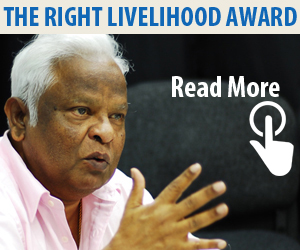by Basil Fernando – Right Livelihood Award Laureate 2014
(This is an article issued on the occasion of receiving the Right Livelihood Award-2014)
 In 1989 when I learned that some people, due to malice or some other reason unknown to me, had entered my name into a list of persons to be disappeared, a stream thought began to flow in me.
In 1989 when I learned that some people, due to malice or some other reason unknown to me, had entered my name into a list of persons to be disappeared, a stream thought began to flow in me.
It was not about myself that I was thinking. I knew that my father, who had lived his long years as a peaceful man, would die within a short time as a disturbed man. My brother and sisters would be devastated all their lives. Above all, the fate that would befall my three-months-pregnant wife and the child to be born rose before my mind’s eye, an unending nightmare.
It is these thoughts that reoccur when I see anyone from a disappeared person’s family. I have met many of them, very many of them. I also know that the actual numbers of persons from such families has to be counted in the tens of thousands. How cruel the fate that befall on families of the disappeared is demonstrated by the death of Nanada Prasad Adhikary (Nepal), whose death is reported as I write this. He, a father of a young man who was disappeared after arrest, fasted with his wife, demanding to know the whereabout of his son. He died on the 333 day of his fast.
I have constantly thought these thoughts for over 25 years. It is a sufficiently long enough time to have an understanding of this problem. What I do know with some certainty is that there is no genuinely consoling word that anyone can say to members of such families.
When there is no sensible answer as to why
People who lived in Sri Lanka in the late 1980’s would not ask why someone’s name was on the list prepared by local Members of Parliaments as persons to be disappeared. At the time, all rational criteria were suspended. The identity of the person who prepared each list and the basis on which a particular name was entered are not recorded anywhere. All laws and rules regarding public record-keeping were also suspended. The decisions on death and burial were reduced to a private affair. Arrest, interrogation, killing, and burial were sealed with secrecy. All these changes in the law and rules were done at the very top.
What people experienced in the South of Sri Lanka, also became the experience of the North and East for almost 30 years.
 The following legal rules were permanently displaced: that only a judge can decide on imposing punishments that affect the life and liberty of an individual; that even this can only be done after a fair trial conducted in an open court; that the accused has the right to defend himself through a legal representative; that all the proceedings and the reasons for judgment must be recorded, and that the record is a public document; that the affected persons have a right to an appeal to a higher court.
The following legal rules were permanently displaced: that only a judge can decide on imposing punishments that affect the life and liberty of an individual; that even this can only be done after a fair trial conducted in an open court; that the accused has the right to defend himself through a legal representative; that all the proceedings and the reasons for judgment must be recorded, and that the record is a public document; that the affected persons have a right to an appeal to a higher court.
All this was replaced with a new formula in which the accuser, investigator, witness, prosecutor, judge and, executioner all became one.
Family members of disappeared persons, trying to trace what has happened, would have only rumours to go by, or the visions of the devil dancers.
I have reflected on these issues in the following poems.
By the wayside
This wreath
With no name attached
Is for you
Who have no grave.
As the place of earth
Which embraced you
Could not be found,
This wreath was placed by the wayside.
Forgive me.
Forgive me
For placing a memorial for you
By the roadside.
Monument to the Disappeared, Waduwa Junction, Seeduwa, Sri Lanka
(Translated from Sinhala by the author)
Witchdoctor’s joy
He died
He was killed
We know
But we pretend not to.
“Justice”,
What is that?
We have heard
It is beautiful
As we have not seen it,
We do not know if that is true
It is wrong to forget,
And there is nothing
We can do even
If we remember
Except to light a candle
And tell God.
The witchdoctor awaits us
Eagerly.
Of the dead one
Is the witchdoctor’s interest
All that is left?
Judges look away
When they see us
Those who know us
Move away, looking down
Only the witchdoctor
Awaits us with joy.
(Translated from Sinhala by the author)
The sea was calm behind your house
(A poem dedicated to M. I. Kuruvilla)
On a day in July 1983
When our nation had gone mad
I visited you
The sea was calm behind your house.
You greeted me as before.
But something had gone wrong
We both knew.
Measured silence we kept.
You were the master,
I was the child.
We had played that game before,
But that day it stopped.
Our cheerful beliefs shattered,
We saw the unknown unfolding,
Fates smiling truant and gods mocking.
The sea was calm behind your house.
Suggested Readings:
A Sociological Exploration of DISAPPEARANCES In Sri Lanka– Jane Thomson-Senanayake- Published by Asian Human Rights Commission-
E-copy available here
An Exceptional Collapse of the rule of law- As told by Families of the disappeared in Sri Lanka – Published by Asian Human Rights Commission- E-copy available here